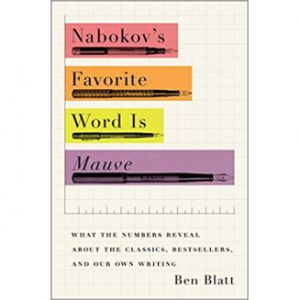As an ESL teacher who has written and adapted texts for limited English speakers I have long used and recognized the value of such tools as word frequency counters and readability checkers to make sure readings I assigned were appropriate for students. As I writer I make some use of these tools to keep an eye on my word use and help me avoid overusing certain words, or certain types of words such as modifiers. So when I came across this book full of statistical textual analyses, it was right up my alley.
The first chapter about how the debate over the authorship of some of the Federalist Papers was settled by a couple of statisticians in the early 1960’s was terrific (pity the poor research assistants who had to do the word counting manually, without computers!). The power of statistical analysis for literary and historical purposes is clearly demonstrated and engagingly recounted (I really wanted to use that word here), but my feeling is that the author may have served up too much of a good thing. I got tired of the numbers and charts pretty quickly.
Don’t get me wrong. There’s a lot to like and learn from in this book. The author investigates many interesting questions including whether an author’s style can be identified by an algorithm; which authors use cliches and adverbs most and least frequently; whether men’s and women’s writing differ; which authors tend to start their works with short sentences and which with long ones, and whether an author tends to write longer or shorter books as her/his career progresses. The research into such matters as what words various authors use more than the norm is interesting but not ultimately that useful. So what if Ray Bradbury uses the word icebox a lot and Amy Tan is fond of the word gourd? And that really goes for much of the results. Hemingway uses short sentences, Faulkner long ones. What can we actually learn by comparing the sentence length of different authors, or other stylistic features?
To be fair, the author never claims that a work’s merits can be determined through statistical analysis or that following some formula will result in a literary masterpiece. I will also add that the writing is entertaining. And one thing I remain grateful to Ben Blatt for is turning me on to a wonderful story by Roald Dahl called The Great Automatic Grammatisator. But after finishing this book I did have a hankering to sit down to read a good story that someone was able to spin without giving any thought to how long the sentences were or how many adverbs were used.
Nabokov's Favorite Word Is Mauve
by Ben Blatt
What the Numbers Reveal About the Classics, Bestsellers, and Our Own Writing
Book Details from Amazon
- Paperback: 288 pages
- Publisher: Simon & Schuster; Reprint edition (March 20, 2018)
- Language: English
- ISBN-10: 1501105396
- ISBN-13: 978-1501105395
- Average Customer Review: 4.5 out of 5 stars 37 customer reviews


